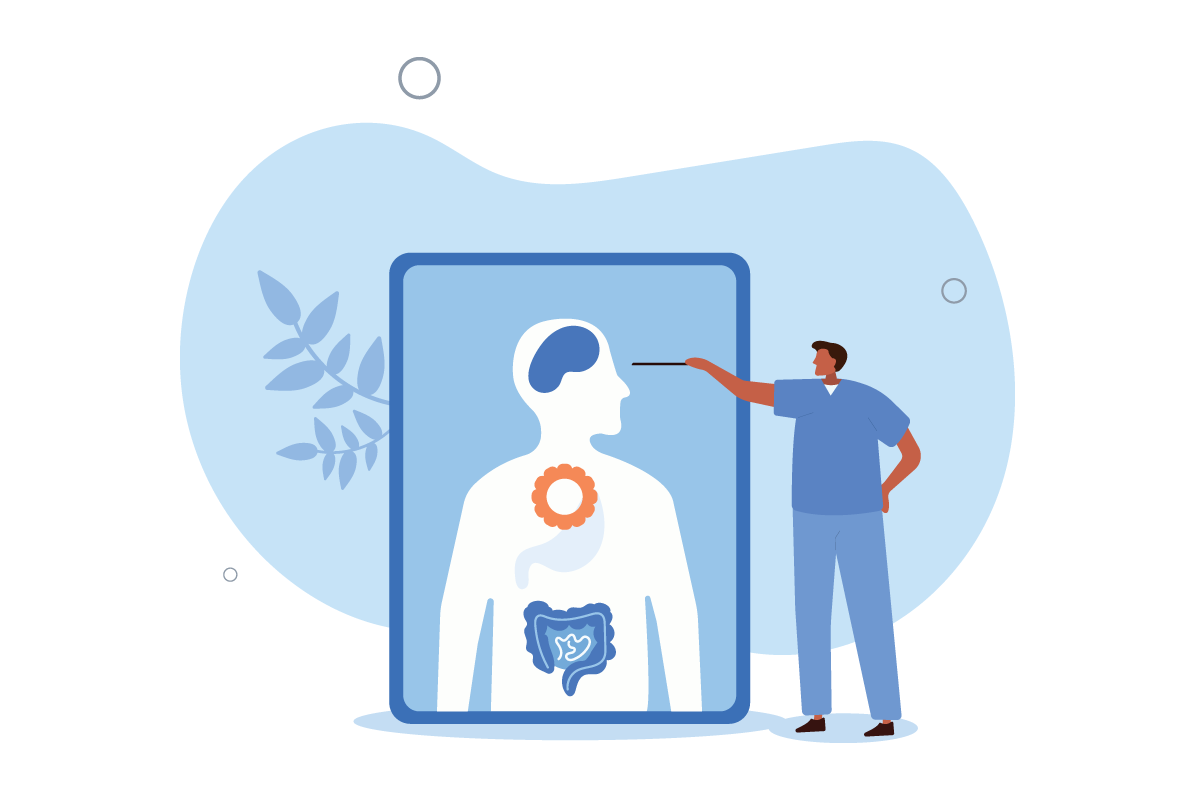If you struggle with stomach or intestinal issues, you’re not alone. Uncomfortable digestive symptoms affect the daily lives of 40% of Americans. Research has shown that your brain may play a significant role in the health of your gut.
To learn more, WellTuned spoke with Dr. Cristin Trecroce, a physician and medical director with BlueCross BlueShield of Tennessee.
How your brain and your gut are connected
Dr. Trecroce: Your central nervous system is made up of your brain and spinal cord. They communicate with other parts of your body by sending signals through nerves, nerve cells, and chemicals called neurotransmitters. But inside your gut, you have another nervous system, which is called the enteric nervous system. It relies on the same kind of methods of communication. Some even call it the “second brain” as a result.
The bacteria that live in your gut may also affect your brain—and vice versa. The bacteria that live in your intestinal tract are called your gut microbiota. You have tens of trillions of microorganisms in your gut. They seem to communicate with your brain through your nervous system by using neurotransmitters.
Experts are still learning about the gut-brain connection, and we need more research. There’s clearly a two-way communication between gut and your brain. Certain signals that originate in the digestive system affect certain health conditions. Likewise, the gut responds to signals from the brain in response to emotions or even environmental stimuli. Research suggests that a type of probiotic bacteria known as Lactobacillus rhamnosus in your gut actually produce a neurotransmitter that can affect your brain and reduce your anxiety levels.
How anxiety and stress may affect your microbiome
Dr. Trecroce: Your anxiety may be affecting your gut. You can’t blame it entirely for your stomach problems. For example, stress does not cause irritable bowel syndrome, but it can trigger symptoms or make them worse.
When you’re anxious, your body releases chemicals and hormones. These can affect your gut and the bacteria that live there. The result could lead to a variety of symptoms, including constipation, upset stomach, indigestion, nausea, or diarrhea.
If stress or anxiety are causing physical symptoms in your gut, you might benefit from seeing a behavioral health specialist. They may be able to help identify the causes of your stress and develop strategies for reducing their impact.
WellTuned: is there a connection between food and mood?
Tip: if you’re struggling with GI symptoms and wonder if there’s a connection to your stress, write down your symptoms and the events that may have triggered them. Take the list with you when you see an expert so you can determine if there are any patterns that you can address.
Having a serious or chronic medical condition can also take an additional toll on your gut. You may still need to see a specialist for treatment for that condition, but a behavioral health specialist can help you cope with stress caused by it.
How to improve your gut health
Dr. Trecroce: In general, it’s a good idea to take care of your gut. In fact, everyone can benefit from doing that. One great way to start is to practice mindful eating. That means slowing down and paying attention to what you eat and why. Also, I’d suggest a balanced diet with plenty of nutrients, including a variety of fruits and vegetables.
Another strategy to consider: widen your idea about acceptable sources of protein. You don’t have to eat meat to get plenty of protein in your diet. You might try exploring plant-based sources of protein.
Also, pay attention to how the food that you eat affects your body. Avoid eating anything that causes issues that create discomfort. If you’re not sure what you should be eating or avoiding, talk with your doctor about your nutritional needs and how to eat to promote optimal health.
The bottom line: don’t underestimate the power of food and how it affects your overall health.
Get more information about specific health terms, topics and conditions to better manage your health on bcbst.com. BlueCross BlueShield of Tennessee members can access wellness-related discounts on fitness products, gym memberships, healthy eating and more through Blue365®. BCBST members can also find tools and resources to help improve health and well-being by logging into BlueAccess and going to the Managing Your Health tab.


